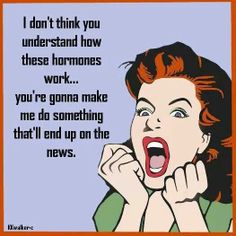Some Basics about Hormones.
What are they? Chemical messengers that travel through the body via the bloodstream. They start at endocrine glands and take messages to the cells. We have many endocrine glands and a multitude of hormones, which can interact with one another. In other words – it’s complicated!
Sex hormones are a just a few of the many hormones in the body. They are steroidal hormones, which means they are made from cholesterol.
“What!?”, you say, “I thought cholesterol was bad for me”.
This is a common misconception that results in many people avoiding eating foods containing cholesterol despite the fact that we now know that eating cholesterol and saturated fat does not cause heart disease.
What can go Wrong with our Sex Hormones?
When we don’t ingest cholesterol and fats, the liver has to make cholesterol in order that we have the ingredients to build our sex hormones. If the liver is under stress (and it may well be in our toxic world) it may not be doing that as effectively as we would like.
Nutrition Tip #1
Take the burden off the liver from making cholesterol. Provide the body the foundational ingredient for your sex hormones.
Eat cholesterol containing (animal) foods and don’t be afraid of fat.
- Eat fattier cuts of meat (grass fed, organic)
- Eat full fat dairy (if you tolerate dairy)
- Eat Pastured eggs
What else can go wrong?
Stress
Our stress hormone, cortisol, is also a steroidal hormone, made from cholesterol. It regulates bloods sugar and metabolism in response to a threat. Even though our stress may be low grade, our body can still be in fight or flight mode. This survival function is prioritized above sex hormone production and they take a dive!
Nutrition Tip #2
Reduce stress on the system. Avoid these stressors as much as possible: sugar, junk food, alcohol, trans fats, industrial seed oils. If you suspect you may food sensitivities or have issues with your gut then you may be irritating your system. Get in touch to find out how to work through this one. It can take some detective work.
Nutrition Tip #3
Support the body with handling stress by making sure you get enough B vitamins such as pantothenic acid and B12.
Adaptagenic herbs can be supportive to your body too and help modulate your stress response.
Problems with Detoxification
Unfortunately our modern environment comes along with a variety of xenoestrogens and other hormone disrupters. Supporting the detoxification of excess and unhealthy hormones and supporting the liver can help the body stay in balance.
Nutrition Tip #4
Fiber is important for this as it helps the body excrete excess hormones so include plenty of fibrous vegetables in the diet.
The cruciferous vegetables, as well as supplements like DIM and Calcium D Glucarate, support the liver with hormonal detox.
Nutrition Tip #5
Get rid of toxins as much as you can. Nutritionally you can upgrade your food to organic and grass fed options that do not contain toxic chemicals such as pesticides, herbicides, antibiotics and hormones.
If you answered the questionnaire in my last blog, Sex Hormone Imbalance and you think you have hormonal imbalances, what do you do next? You can start by adjusting your nutrition and lifestyle with some of these tips. If you need to go deeper or need more specific help, that’s where we come in. Our micronutrient and hormonal blood testing as well as education and coaching can help you get there!


 RSS Feed
RSS Feed
